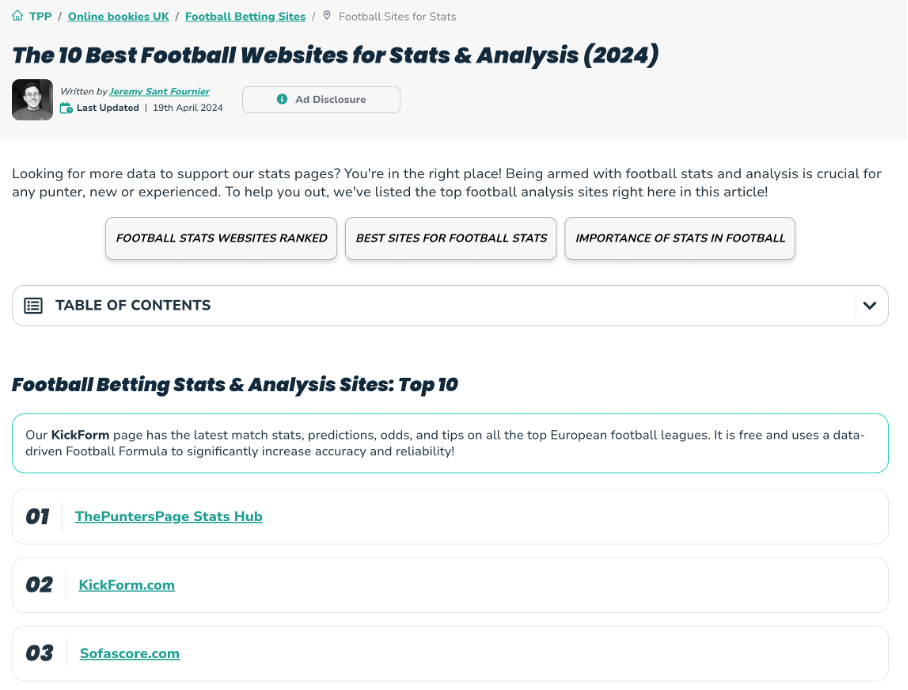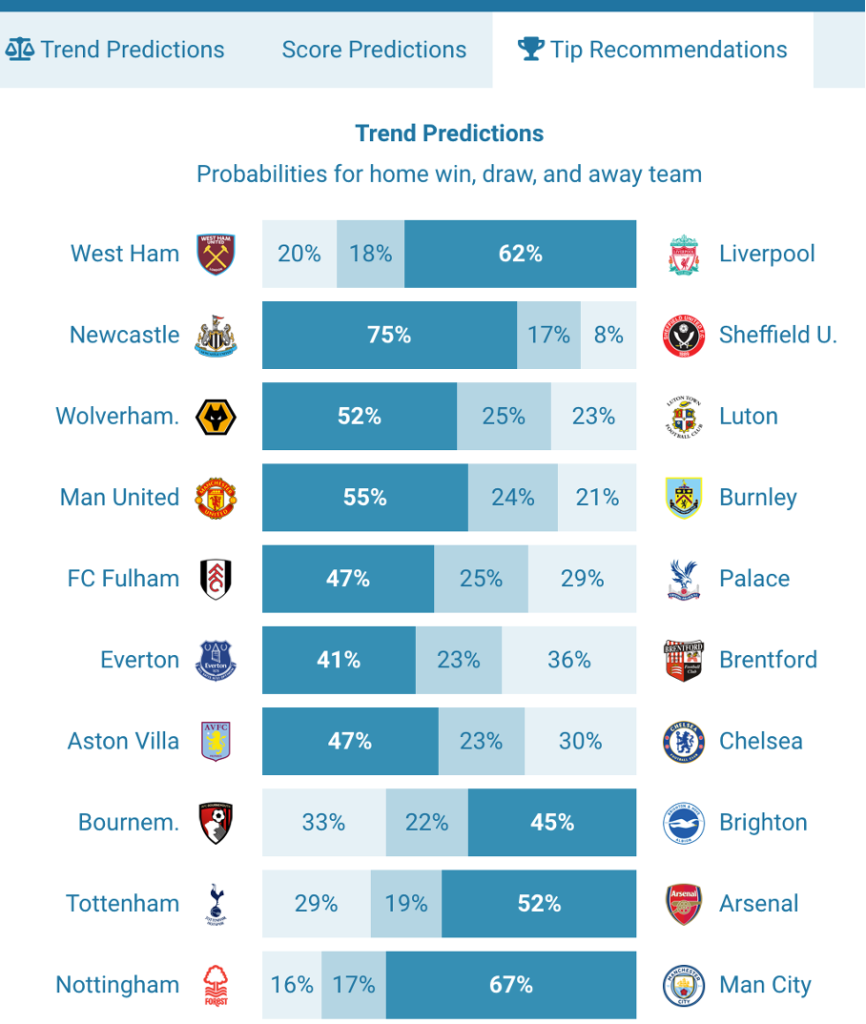What is a Football API?
A Football API, also known as an Application Programming Interface, is a software interface that allows developers to access and retrieve football data for various competitions in different programming languages. (Medium) It provides a streamlined way for developers to integrate and utilize this data in their applications, websites, or software solutions.
With a Football API, users can access football-related data, including match schedules, live scores, player statistics, team information, and more. This data can be used to build football-focused applications, create statistical analysis tools, and power football widgets, among other possibilities.
How does a Football API work?
A Football API supports multiple programming languages, making it accessible for developers of different technologies. Whether a developer uses Python, JavaScript, PHP, or any other language, they can easily access the API and retrieve the desired football data.
To obtain access to the Football API, developers must sign up for an account at their Football Data Provider and obtain an API token 99% of the time. These credentials are unique to each user and are required to authenticate every API request. The process is typically straightforward and can be completed online through the Sports Data provider’s website.
In summary, a Football API is a valuable tool that allows developers to access and retrieve football data for various leagues and cups. It supports multiple programming languages and requires an API key for authentication, enabling developers to utilize the API and its data in their applications and software solutions.
How is Football Data collected?
In the fast-paced football world, every pass, tackle, and goal is more than just a moment on the field—it’s data waiting to be harnessed. But have you ever wondered how this wealth of information is collected? Join me as we delve into the aspects of reliable football data collection. I’ve compared multiple Sports Data Providers and their resources to see how they do it. And the answer might surprise you.
Human data analysts
The English Premier League boldly states: “Live data is collected by a three-person team covering each match.” (Premier League)
Imagine this: for every match, there’s a three-person dream team on the job. They’re like the unsung heroes of football stats. Their mission? To catch every single moment during the football match. But they’re not just watching; they’re documenting who did what and exactly where it went down on the pitch.
Data collection isn’t just about recording highlights but capturing every detail. Those key passes and game-changing tackles don’t escape these eagle-eyed analysts.
So, next time you’re poring over detailed statistics or reliving a match, remember, there’s a human team behind the scenes making sure every kick counts. On top of that, all the Premier League data collected is then subject to an exhaustive post-match check to ensure accuracy.
But that can’t be all, right?
Match Tracking Technology:
You’re correct; at the heart of football data collection lies cutting-edge match-tracking technology. Sophisticated camera systems, such as Optical Tracking Systems (OTS) and Computer Vision, are strategically placed around the stadium to capture every movement with unparalleled precision. These cameras meticulously monitor players, the ball, and even the referees, generating a constant stream of data that forms the backbone of performance analysis.
Players are collecting data
Beyond the pitch, professional footballers are equipped with wearable technology that revolutionizes data collection. These devices provide invaluable insights into player performance, from GPS trackers embedded in their jerseys to advanced chips in their boots. Metrics like distance covered, sprint speed, and heart rate variability seamlessly integrate into the data pool, offering coaches and analysts a comprehensive view of player exertion and recovery. Professional football clubs and organizations thrive on this information, and for us, this is excellent knowledge for player analyses and detailed statistics.
Fan engagement
Football data isn’t just for coaches and scouts—it’s for the fans too. With the rise of digital platforms and sports apps, supporters can access a treasure trove of statistics and insights. From real-time sports data to post-match data analysis, football fans can immerse themselves in the beautiful game like never before, fostering a deeper connection with their favourite teams and players.
Benefits of Using a Football API
Using a football API offers many benefits, explicitly increasing user engagement on websites or mobile applications. One major advantage of using a football API is the reliable data it provides. It depends on your applications’ needs, but there are Football API providers who offer over 2,000 competitions. Such as Statsperform and Sportmonks. This ensures users can access accurate and up-to-date information about their favourite teams, players, and matches.
One key convenience of using the football API is its personalized access through a unique API key. This personalized access allows users to stay logged in, simplifying the testing and development process. With a personalized API key, users can access the API without needing repeated logins, making it an efficient option for developers.
Overall, the benefits of using a football API include:
- Increased user engagement through reliable data.
- Easy implementation through programming language compatibility.
- Personalized access for simplified testing and development.
- Automatic data updates, of course, based on your integration.
Using these features, websites, and mobile applications can provide users with a rich and engaging football experience.
Access to a wide range of real-time data
Access to a wide range of real-time data is becoming increasingly valuable for users in various industries, including sports. By providing up-to-date information on scores, match events and other relevant statistics, real-time data enhances users’ experience and enables them to make informed decisions, particularly in sports betting.
One key benefit of accessing real-time data is the ability to stay updated. Sports enthusiasts can quickly obtain comprehensive sports data, making them aware of the latest scores, injuries, substitutions, and other crucial developments in their favourite sports. This real-time access to information ensures that users stay engaged and informed, enhancing their overall experience.
Furthermore, real-time data is especially valuable for individuals involved in sports betting. With access to real-time odds and statistics, bettors can make informed decisions and place bets based on the most recent information. This increases the likelihood of winning and improves customer satisfaction as users have confidence that they are making decisions based on accurate and timely data.
Ability to track detailed player statistics and match statistics
Several methods and websites can be utilised to track player and match statistics for football analysis and betting. Now, the best part is that almost every listed website is built thanks to a Football API and a Sports Data provider. So, if you need inspiration, it might be worth checking these websites:

The Punters Page Stats Hub
One such website is ThePuntersPage Stats Hub, which comprehensively overviews all interesting football statistics websites. Statistics websites, such as flashore.com, provide detailed information on various metrics, including goals, assists, shots on target, passing accuracy, and more. They also allow users to analyze team performance, compare player statistics, and make informed decisions for betting purposes.
KickForm
KickForm.com is another valuable website for tracking player and match statistics. It provides detailed analytics and insights for football matches. Users can access information on team performance, individual player statistics, and historical data to aid analysis and betting decisions.


SofaScore
SofaScore is a popular mobile app and website that offers live scoring and statistics for football matches. It provides detailed player statistics, including goals, assists, passes, and tackles. Users can also access match statistics such as possession, shots on target, and fouls. SofaScore is a valuable resource for real-time analysis and tracking player and match statistics.
FBref
FBref is a comprehensive football statistics website that offers a wide range of player and match statistics. It provides detailed information on goals, assists, passing accuracy, shots on target, and much more. Additionally, FBref allows users to compare player statistics across different leagues and seasons.

Overall, these websites – ThePuntersPage Stats Hub, KickForm.com, SofaScore, and FBref – provide data for tracking player and match statistics, enabling football analysis and informed betting decisions. Are you already convinced? Check out my blogs, where I’ve compared various Football API providers.
Major Leagues Covered by Football API Providers
This section will explore some of the major leagues covered by football APIs, highlighting the wealth of data available for developers to leverage.
Popular Leagues
The Big 5 European Domestic Leagues are among the most renowned and prestigious leagues in the football world. They include the English Premier League, Spanish La Liga, German Bundesliga, Italian Serie A, and French Ligue 1. These leagues are home to some of the most successful and iconic clubs in football history, such as Barcelona, Real Madrid, Bayern Munich, Juventus, Manchester United, Liverpool, and many more. Furthermore, these leagues are the most popular for building a Fantasy Game.
The leagues are a must-have for every Sports Application, and your Sports API provider should cover them. Otherwise, it’s a no-go.
UEFA Europa Leagues
In addition to the national leagues, you need some interesting international leagues in your application.
UEFA Champions League:
The UEFA Champions League is Europe’s premier club football competition, organized by UEFA. It showcases the continent’s elite teams. It involves a group stage followed by knockout rounds. The winner secures a coveted spot in the following season’s Champions League.
UEFA Europa League:
The UEFA Europa League is a prestigious football competition organized by UEFA, featuring top clubs from across Europe. It follows a similar format to the UEFA Champions League, with a group stage and knockout rounds, with the winner earning a spot in the UEFA Champions League. It provides an exciting platform for clubs to compete on the European stage.
UEFA Conference League:
The UEFA Conference League, a newer addition, offers another avenue for clubs to compete in European football. It features a group stage and knockout rounds, with the champion earning a place in the following season’s Europa League.

Your Football API provider should definitely cover these leagues. Take a look, for example, at Sportmonks. They offer over 2,200 football leagues and cups, including the most popular leagues.
Features Offered by Football APIs
Football APIs are valuable tools that provide developers with access to a wide range of data and information related to the sport. In this chapter, we will explore some of the key features of Football APIs and highlight their advantages to developers and the overall football community.
1. Live Scores:
One of the most popular features Football APIs offers is the ability to access live scores from various football matches worldwide. With real-time updates, developers can provide users with the latest scores, goals, and match statistics, ensuring that fans never miss a moment of the action. This feature is handy for sports betting applications and live score websites, where accurate and timely information is crucial.
2. Player and Team Statistics:
Football APIs provide comprehensive details about players and teams, ranging from player profiles and statistics to team line-ups and performance history. Developers can integrate this data into their own platforms to enhance fan engagement and provide a more immersive experience. Whether accessing player profiles, comparing performance stats, or retrieving team information, Football APIs offer a wealth of data that keeps fans informed and entertained.
3. Fixtures and Results:
Developers can retrieve fixtures and results from various leagues and competitions by accessing Football APIs. This feature allows users to stay updated with upcoming matches, view past results, and track the progress of their favourite teams. By integrating fixtures and results into their applications, developers can provide a comprehensive football hub where fans can access all the information they need in one place.
4. Historical Data:
Football APIs offer access to extensive historical data, including past match results, player statistics, and team records. This feature is particularly valuable for data analysis, research, and generating insights. Whether it’s for professional purposes or personal curiosity, the availability of historical data allows developers to create a deeper understanding of the sport and its past, enabling new possibilities in data-driven applications and platforms.
Conclusion
In conclusion, Football APIs serve as invaluable resources, enriching the football experience for enthusiasts, developers, and analysts alike. By integrating Football APIs into your applications or websites, you gain access to a wealth of timely, accurate, and reliable football data.
Are you searching for a reliable football data provider? Consider exploring Sportmonks Football API. With its comprehensive coverage, self-service, and commitment to quality data, Sportmonks is a trusted partner for all your football data needs.
So why wait? Dive into Football APIs today and elevate your soccer experience to new heights!